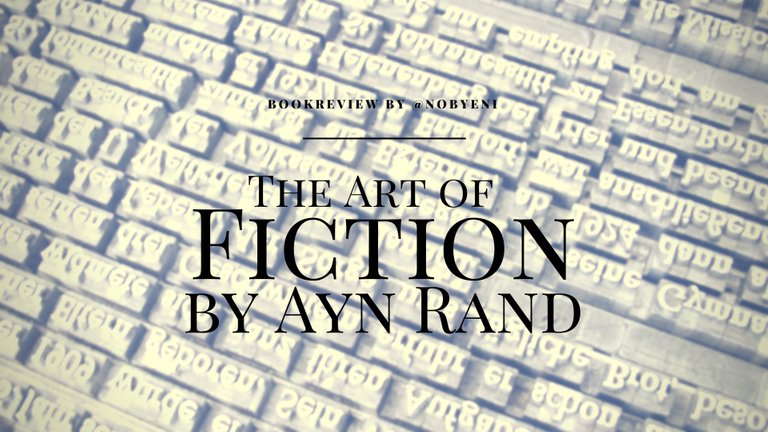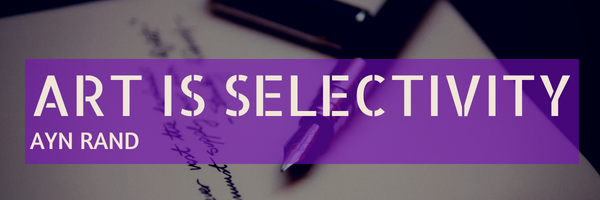
"I was conscious of my purpose throughout the job - the general purpose of the novel and the particular purpose of every chapter, paragraph, and sentence." ~ Ayn Rand
Great books are a pleasure to read, both as a reader and as a writer who reads to learn more about the art of writing fiction. How wonderful then is to have the author of some of the books you really liked, talk about her approach to writing them!
The Art of Fiction: A Guide for Readers and Writers
Ayn Rand gave some private lectures in 1958, after her appearance of her 'magnus opus' Atlas Shrugged, which have been recorded and edited into a series of essays about different aspects of the art of the novel. In these essays she goes into details about her own work and the works of other authors she admires. She is very clear about certain things, and will be very precise about why she considers this or that novel good or not.
It's all about purpose. Without having a higher purpose, a central theme, an underlying theme for what you're writing, there is no novel. Or at least the is no plot. For Rand a plot is a purposeful progression of events. Leading to a climax, where all plots converge and get resolved. The minor ones before the big ones. Without this overall purpose, Rand says, you write something without meaning. You let circumstances decide what happens. She is dead set against this approach. And with reason. Because of... reason. It's man's great ability to give purpose to his or her life, or to fail in doing so, but this is what makes novels interesting and worthwhile to read. And I agree with her.
Inspiration has to be earned
Another point she stresses is about inspiration. Many authors talk about inspiration as something that comes to them and they have no idea why. And in a way they are right. Writers take things from their unconscious and use it to make something visible. It's not necessary to know how that works. But that doesn't mean it simply comes. A lot of hard work goes into this 'happening'. Rand sees inspiration not as something mystical or religious, but as part of the way the human mind works.
The point thus, for the writer, is to make abstract notions concrete. When you experience something, try to link them to abstract things. And when you know the basic abstract foundation of your novel, what conflicting values drive a character, then make sure you truly understand this abstraction -- by knowing many many ways to make these abstract notions concrete.

For instance, you will not say 'I am giving up on this plan because it's not working' or 'I love this person', but you will find many reasons and ways into which this conviction is shown, is shown through an action.
"If you can unite the two - if you can give a relevant and logical physical expression to the spiritual conflict you present - then you have high-class drama." ~ Ayn Rand
I like Rand's approach. It is exactly how I approach writing non-fiction and it's been great to read a book that deals with all kinds of elements about writing fiction using that specific approach. She talks about the use of emotions, about characters, about internal plots and especially about purpose. And I must admit, much of the writing I don't like misses exactly that: purpose. With purpose she means the intention of the author to convey a specific idea about the world. The purpose doesn't need to be the theme of the book, but in good writing this purpose will be shown between the lines, through actions, by the way things are described. Because that is art, according to Rand:
"Art is selectivity." ~ Ayn Rand
One part I liked especially is where Rand takes a dialogue from Atlas Shrugged and presents it in the version that was published and a rewritten version. Then she analyses what happens, and shows how each dialogue line can break the convention and makes sure the character is revealed through it. Instead of responding to circumstances like what other people say, the people in the example take control over how they respond and what they do, in every word, in every sentence.
Maybe one more quote to end this review. Which is a quote I especially like as it gives me something very concrete in how I can approach the novel I'm planning/plotting/thinking about writing at the moment. It shows that it's a good thing I haven't started writing anything beyond blurbs and notes, and that I wait until I know the full range of things, the main abstractions (not per se all the plotpoints as those can also come through the writing itself), before I start thinking about the first chapter. It will save me a lot of time not having to get rid of everything when I finally find that real voice. And it will help me write everything in line with these fundamental abstractions.
"Every chapter and paragraph of Atlas shrugged is set up on the same principle: what abstraction do I want to convey - and what concretes will convey it?" ~ Ayn Rand
website and the dedicated Discord Channel for more information. Join @thewritersblock! Visit the

Hello @nobyeni, your post has been selected by our curation team and it will be showcased in the weekly exhibition of TALP. The curators of The Alexandria's Library Project found your post to be outstanding and agreed that it is worth recognition.
We strive to find the best posts in matters of Philosophy, History, Science, and Literature. You can read more about the TALP initiative here. You can also join our Discord server in this link.
Best regards, Johanna.